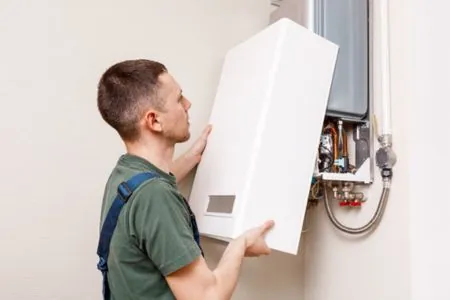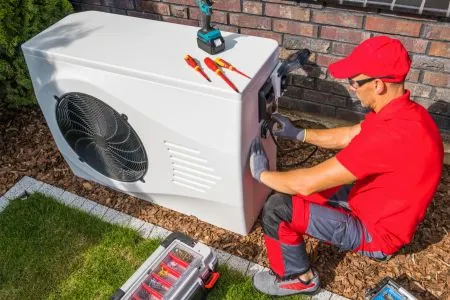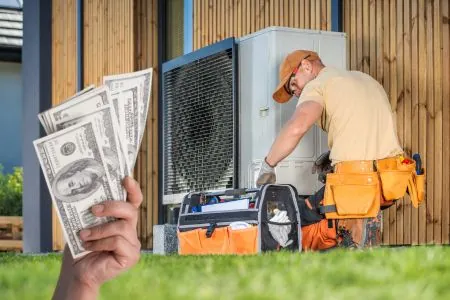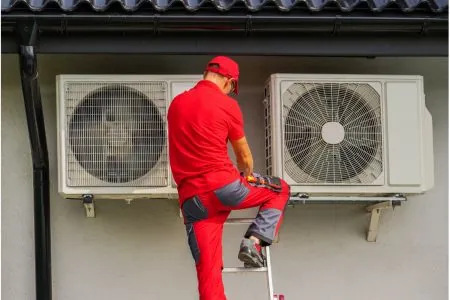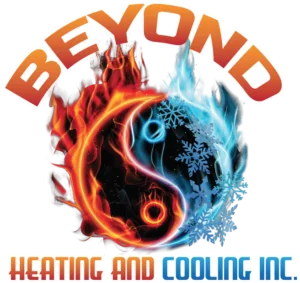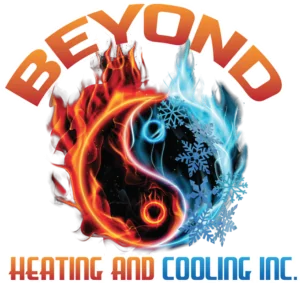There is nothing worse than waking up to a freezing house in the middle of winter, only to realize your heating system has failed. When temperatures drop, a working heater is not just about comfort, it is about safety. Knowing how to handle emergency heating repairs can make all the difference.
Quick action is key if your furnace suddenly stops working, your vents are blowing cold air, or strange noises are coming from your system. Some issues can be fixed with simple troubleshooting, while others require professional help. But how do you know the difference? Understanding the basics of emergency heating repair helps you avoid unexpected breakdowns, saving time, money, and stress.
In this guide, we will discuss common heating problems, quick fixes, and when to call in the residential heating experts. Our goal is to help you stay warm and safe all winter long without the panic of a last-minute emergency. So, before you find yourself bundled up under layers of blankets, let’s dive into the essential steps to keep your home heated and comfortable, no matter how cold it gets outside.
What is Emergency Heating Repair, and When Do You Need It?
Heating repair is the immediate service required when your heating system fails unexpectedly, leaving your home without warmth during cold weather. Unlike routine maintenance, emergency repairs address urgent breakdowns that pose safety risks or cause significant discomfort. Recognizing when your heater needs emergency attention can prevent further damage and costly replacements.
Common Causes of Heating System Breakdowns
Heating systems fail for various reasons, but common causes include dirty air filters, malfunctioning thermostats, electrical failures, and worn-out components. Lack of maintenance can lead to clogged filters, overheating, and reduced efficiency. Pilot light or ignition issues can prevent gas furnaces from producing heat. Identifying these problems early can help you avoid costly emergency repairs.
Why Timely Emergency Heating Repair is Crucial
Delaying heating repairs can lead to higher energy bills, increased wear on your system, and even safety hazards like carbon monoxide leaks. A malfunctioning heater may also struggle to maintain indoor temperatures, forcing it to work harder and causing further damage. Addressing issues immediately ensures your heating system operates efficiently, keeping your home safe and warm throughout winter.
How to Handle Emergency Heating Repair in Albuquerque, NM
Knowing how to respond when your heating system fails unexpectedly in Albuquerque’s cold winter months can make all the difference. Quick troubleshooting may resolve minor issues, but major breakdowns require professional help. Acting fast prevents further damage and ensures your home stays warm. Here is how to handle emergency heating repair effectively.
Troubleshooting Tips Before Calling a Professional
Before calling a technician, check the thermostat settings to ensure they are appropriately adjusted. Replace or clean dirty air filters, as clogged filters restrict airflow and cause overheating. Inspect the circuit breaker to confirm the furnace is receiving power. If your gas furnace isn’t working, check the pilot light and ensure the gas supply is turned on.
Finding Reliable Emergency Heating Repair Near Me
A quick online search can help you find trusted emergency heating repair services in Albuquerque. Look for companies with strong customer reviews, 24/7 availability, and licensed technicians. Verify pricing transparency and response times before committing. Asking neighbors or checking with local HVAC associations can also help identify reputable professionals who can restore your heating system quickly and efficiently.
What Factors Affect Emergency Heating Repair Costs?
Emergency repair costs vary depending on several factors, including the type of system, the severity of the issue, and the time of service. Understanding these cost drivers helps homeowners budget for unexpected repairs and make informed decisions. Here is what impacts the price of emergency heating services.
Type of Heating System and Repair Complexity
The cost of repairs depends on the type of heating system, gas furnaces, electric heaters, and heat pumps each have different components and repair needs. Complex repairs, such as replacing heat exchangers or fixing electrical circuits, require more labor and parts, increasing costs. Simple fixes like thermostat adjustments or filter replacements are generally more affordable.
Time of Service and Urgency
Emergency heating repairs requested after hours, on weekends, or during peak winter months typically cost more due to higher demand and technician availability. Service providers may charge extra for immediate responses, especially if extreme weather conditions require urgent repairs. Planning regular maintenance and addressing minor issues early can help avoid the premium costs of emergency services.
How to Prevent the Need for Emergency Heating Repair
Preventing emergency heating repairs starts with proactive care and routine maintenance. Regular system checkups can help catch minor issues before they become costly breakdowns. Homeowners who stay on top of heating system upkeep can extend its lifespan, improve efficiency, and avoid sudden failures during winter. Here’s how to reduce the risk of emergency repairs.
Regular Maintenance and Inspections
Annual professional inspections help ensure your heating system operates efficiently. HVAC technicians check for worn-out parts, clean internal components, and make necessary adjustments. Regular tune-ups prevent breakdowns, improve energy efficiency, and reduce long-term repair costs. Scheduling maintenance before winter ensures your system is prepared for colder temperatures and heavy use.
DIY Tips for Keeping Your Heating System in Top Shape
Changing air filters every 1-3 months improves airflow and prevents system strain. Keeping vents and registers unobstructed allows for proper heat distribution. Checking for unusual noises, odd smells, or inconsistent heating can help catch problems early. Homeowners should inspect outdoor units for debris buildup and ensure the thermostat functions correctly to maintain consistent indoor temperatures.
Is Emergency Heating Repair Worth the Cost?
When your heating system fails unexpectedly, the cost of emergency repairs can seem high. However, restoring heat quickly is often necessary for comfort and safety. Weighing the cost of immediate maintenance against the potential expense of a complete system replacement can help homeowners make informed decisions about their heating needs.
Comparing Repair Costs to Replacement Costs
Repairing a heating system is often more affordable than replacing it, especially if the issue is minor. However, replacement may be a better investment if the unit is older or experiencing frequent breakdowns. A new system offers improved efficiency, lower energy costs, and fewer repair needs, making it a cost-effective long-term solution.
The Value of Staying Warm and Safe During Winter
A malfunctioning heater in freezing temperatures can lead to serious risks, including frozen pipes, health concerns, and unsafe indoor conditions. Emergency heating repair ensures your home remains warm, preventing costly damage and discomfort. While repairs can be expensive, the cost of going without heat during extreme weather far outweighs the price of fixing a broken system promptly.
Finding Emergency Heating Repair Near Me in Albuquerque, NM
When your heating system fails unexpectedly, finding a reliable emergency repair service in Albuquerque, NM, is crucial. The correct HVAC provider should offer fast response times, skilled technicians, and transparent pricing. Knowing what to look for and where to find trusted professionals ensures you get quality service when needed.
What to Look for in an Emergency Heating Repair Service
A dependable heating repair service should offer 24/7 availability, experienced and certified technicians, and transparent upfront pricing. Look for companies with positive customer reviews, quick response times, and a solid reputation for reliability. Checking for proper licensing and insurance also ensures you work with a qualified professional who can safely handle emergency repairs.
Local Resources for Albuquerque, NM Residents
Albuquerque residents can find emergency heating repair services through online directories, local HVAC company websites, and customer review platforms like Google and Yelp. Utility companies or home warranty providers may also offer recommendations for trusted contractors. Checking with local organizations like the Better Business Bureau or HVAC trade associations can help verify a company’s reputation before scheduling a repair.
FAQs
How much does emergency heating repair typically cost in Albuquerque, NM?
Emergency heating repair in Albuquerque typically costs between $150 and $600, depending on the issue, system type, and service time.
How quickly can I get emergency heating repair near me?
Most HVAC companies offer 24/7 emergency services, with response times ranging from one to four hours, depending on demand.
What should I do if my heating system breaks down in the middle of the night?
Check the thermostat, circuit breaker, and air filter. If the problem persists, call a 24/7 emergency HVAC service for immediate assistance.
Conclusion
A reliable heating system is essential for staying safe and comfortable during winter. Understanding emergency heating repair helps homeowners respond quickly to breakdowns, minimizing stress and costly damage. Regular maintenance, timely repairs, and choosing a trusted HVAC provider can prevent unexpected failures. Whether troubleshooting minor issues or calling a professional, taking the right steps ensures your home stays warm when it matters most. Call us today to get started!
drain, leak, evaporative cooler, new mexico, heat pump, duct, pump, furnace, air conditioning, boiler, electrician, indoor air quality, refrigerant, emergency, thermostat, bathroom, energy, customer, inspection, air filter, swamp, extended warranty, air handler, heating and air, plumbing heating, plumbing company, heating cooling, heating furnace repair, hvac, albuquerque furnace repair, water heater repair, water heater installation, electrical services, sewer line repair, emergency heating, air conditioning repair, albuquerque hvac, hvac maintenance, reliable hvac, furnace repair, furnace repair services, plumbing heating cooling, schedule service, hvac services, plumbing services, albuquerque plumbing company, request service, albuquerque plumbing, heater repair in albuquerque, gas leak, technician, warranty, heating system, shower, pueblo, customer satisfaction, roof, noise, emergency service, sink, bosque, pipe, sheet metal, customer service, construction, airflow, carbon monoxide, efficiency, fireplace, heating and cooling albuquerque, offer financing, heating and cooling, replacement, trenchless sewer repair, hvac albuquerque, plumbing and heating albuquerque, best hvac companies albuquerque, hvac repair albuquerque, albuquerque plumbing heating & cooling, hvac companies albuquerque, albuquerque plumbing heating & cooling albuquerque nm, albuquerque hvac companies, hvac albuquerque new mexico, albuquerque plumbing heating, leak detection, expert, reputation, filtration, water heating, commercial plumbing, hvac service, furnace service, pride, rebate
What kind of heating and cooling in Mirabella subdivision Albuquerque?
The heating and cooling options in the Mirabella subdivision of Albuquerque include energy-efficient furnaces, central air conditioning units, and ductless mini-split systems, tailored to meet the comfort needs of both residential and commercial spaces.
Is Gibson heating and cooling still in business in Albuquerque New Mexico or Rio Rancho New Mexico?
Gibson Heating and Cooling is no longer in business in Albuquerque or Rio Rancho, New Mexico. Customers seeking heating and cooling services in these areas may want to consider other local options such as Beyond Heating and Cooling.
What services does Beyond Heating and Cooling offer?
Beyond Heating and Cooling offers a comprehensive range of heating and cooling services, including furnace installation, air conditioning repair, plumbing solutions, and vent cleaning for both residential and commercial properties in Albuquerque, NM.
How can I schedule a heating repair?
Scheduling a heating repair is simple. You can contact Beyond Heating and Cooling by calling our office or filling out the online service request form on our website. Our team will respond promptly to arrange a convenient appointment.
What are common HVAC issues in Albuquerque?
Common HVAC issues in Albuquerque include inadequate heating or cooling, frequent system breakdowns, and poor indoor air quality due to dust and allergies. Additionally, extreme temperature fluctuations can affect system efficiency, leading to higher energy costs.
How do I maintain my heating system?
Maintaining your heating system involves regular checks and cleaning. Ensure the filters are replaced every 1-3 months, schedule annual professional maintenance, keep vents clear, and check the thermostat settings for optimal performance.
What are the signs of HVAC failure?
The signs of HVAC failure include unusual noises, inconsistent temperatures, high energy bills, and poor airflow. If you notice these symptoms, it’s essential to contact a professional for evaluation to ensure your system operates efficiently.
How to choose an HVAC contractor?
Choosing an HVAC contractor involves researching their qualifications, checking reviews and certifications, ensuring they provide transparent estimates, and verifying their experience with both residential and commercial systems. This ensures reliable service and satisfaction.
What financing options are available for HVAC services?
The financing options available for HVAC services include flexible payment plans, low-interest loans, and special promotional financing programs to accommodate various budgets and ensure home comfort without financial strain.
What brands of heating systems are available?
The brands of heating systems available include reputable names such as Trane, Carrier, Lennox, and Goodman. Beyond Heating and Cooling partners with these manufacturers to ensure high-quality and reliable heating solutions for both residential and commercial needs.
How often should I service my HVAC?
The frequency of HVAC servicing is essential for optimal performance. It's recommended to service your HVAC system at least once a year, ideally before the cooling and heating seasons, to ensure efficiency and longevity.
What is included in a heating system inspection?
A heating system inspection includes a thorough examination of the furnace, checking for proper functionality, safety, and efficiency. This encompasses inspecting the thermostat, ducts, filters, and overall system components to ensure optimal performance and reliability.
What factors affect heating and cooling costs?
The factors that affect heating and cooling costs include system efficiency, energy rates, home insulation quality, climate conditions, and thermostat settings. These elements can significantly influence your overall energy consumption and expenses.
How can I improve heating efficiency?
Improving heating efficiency involves regular maintenance, sealing leaks in ducts, using programmable thermostats, and ensuring proper insulation. These steps can enhance your system's performance, reduce energy costs, and maintain comfort in your home year-round.
What is the warranty on HVAC services?
The warranty on HVAC services typically covers parts and labor for a specific period after installation or repair. At Beyond Heating and Cooling, we offer comprehensive warranties to ensure your peace of mind and reliable performance of our services.
When to consider replacing my HVAC system?
Considering replacing your HVAC system is important when it's over 15 years old, requires frequent repairs, has inconsistent temperatures, or significantly raises energy bills. Upgrading can improve efficiency and comfort in your home or business.
How can I enhance indoor air quality?
Enhancing indoor air quality involves several key actions: regularly changing air filters, using air purifiers, ensuring proper ventilation, maintaining humidity levels, and avoiding tobacco smoke and harsh chemicals. These practices contribute to a healthier living environment.
What types of heating systems are most efficient?
The most efficient types of heating systems include heat pumps, which transfer heat rather than generate it, and high-efficiency furnaces, which use advanced technology to minimize energy loss. Consider these options for optimal comfort and energy savings.
How does climate affect heating and cooling choices?
The climate directly influences heating and cooling choices by determining the types of systems needed for efficiency. In warmer climates, efficient air conditioning is vital, while colder regions prioritize effective heating solutions to maintain comfort year-round.
What is the average lifespan of heating units?
The average lifespan of heating units typically ranges from 15 to 30 years, depending on the type and maintenance. Regular upkeep can prolong their efficiency and longevity, ensuring reliable comfort for your home or business.
Which heating systems are best for homes?
The best heating systems for homes include energy-efficient options like heat pumps, furnaces, and boilers. These systems provide reliable warmth, cost savings, and comfort throughout the year while accommodating various home sizes and needs.
How can zoning improve energy efficiency?
Zoning can significantly improve energy efficiency by allowing you to control the temperature in different areas of your home or business independently. This targeted approach minimizes energy waste, ensuring that only occupied spaces are heated or cooled as needed.
What is the role of duct cleaning?
The role of duct cleaning is to ensure clean and efficient air circulation within your home or business. This process removes dust, allergens, and debris from the ducts, improving indoor air quality and enhancing the efficiency of your heating and cooling systems.
How to troubleshoot minor HVAC issues?
Troubleshooting minor HVAC issues involves checking the thermostat settings, ensuring power to the unit, clearing any obstructions around air vents, and replacing dirty filters. If problems persist, contact a professional for further assistance.
What benefits do programmable thermostats provide?
The benefits of programmable thermostats include improved energy efficiency, cost savings on utility bills, and enhanced comfort by allowing users to set specific heating and cooling schedules tailored to their lifestyle.
How can I reduce HVAC energy consumption?
Reducing HVAC energy consumption involves several strategies. Regular maintenance, using programmable thermostats, sealing leaks, and upgrading to energy-efficient systems can significantly lower energy usage while maintaining comfort in your home or business.
What emergency services are offered for HVAC?
Emergency services for HVAC include 24/7 repairs for heating and cooling systems, urgent maintenance for breakdowns, and immediate troubleshooting to restore comfort in residential and commercial properties. Our team is ready to respond swiftly to your emergencies.
What benefits does regular HVAC maintenance provide?
The benefits of regular HVAC maintenance include improved energy efficiency, enhanced system lifespan, reduced repair costs, and consistent indoor comfort. Regular service ensures your heating and cooling systems operate optimally, preventing unexpected breakdowns and costly emergencies.
How do I understand HVAC ratings?
Understanding HVAC ratings involves knowing key metrics like SEER (Seasonal Energy Efficiency Ratio) for cooling units and AFUE (Annual Fuel Utilization Efficiency) for heaters. Higher ratings indicate better efficiency, leading to energy savings and optimal comfort.
What to expect during a heating installation?
What to expect during a heating installation is a thorough process. Our team will assess your space, remove the old system, and carefully install the new heating unit, ensuring optimal placement and efficiency for your comfort.
